"Politician vs. IAS": A 16-Point Cheat-sheet for the Politicians
A succinct blueprint for politicians to engage effectively with IAS officers, highlighting the importance of mutual respect and reciprocity in transforming confrontations into collaboration.
Why did I decide to write this piece? As I divulged the simple yet powerful "IAS Officers’ Toolkit to Tackle Political Pressure," an unexpected request echoed from all across the political spectrum1. Public representatives, regardless of their political affiliations, began to seek, nay demand, a similar road-map to help them traverse the intricate and often obscure paths of bureaucracy. Except for a few earnest ones, these requests seemed tinged with a sense of obligatory politeness, under the impression that I would remain loyal to an unspoken Omertà, which they believed was the binding force among civil servants, both serving and retired.
Rising to this veiled challenge, I ventured into the depths of the complex but innocuous slugfest between the civil service and political heavyweights. The result is this comprehensive cheat-sheet, a collection of 16 golden rules. If utilized wisely, this brief operating manual can morph the often convoluted dynamics of politician-bureaucrat relationships into mutually advantageous, and even pleasurable collaborations. To my politician friends, I say - read this, preserve it, and employ it. Thank me later.
If you are a patient politician, go through each point carefully— if you lack patience, you may like to jump directly to the potion of condensed bullet-points, immediately at the end of the 16th point.
1. A Collaborative Approach: Perceiving IAS officers as adversaries only promotes the construction of barriers where pathways of cooperation could have thrived. Rather, envision them as companions on the shared voyage towards delivering effective governance. They are not your rivals engaged in combat but allies in the noble endeavour of serving the public. Embracing a collaborative mindset not only dissipates unnecessary tensions but also unlocks a trove of opportunities for mutual advancement and collective success. In this dance of democracy, the rhythm of partnership is far more harmonious and productive than the discord of confrontation.
2. The Rationale Behind Actions: Unveil the underlying decision-making patterns of IAS officers. Recognize that their actions are primarily steered by a deep-seated commitment to legal parameters, established policies, and the overarching principle of public welfare. In the realm of bureaucracy, a risk-averse tendency is frequently observed. This caution is born out of a system where the scales are tipped in favor of penalizing failures heavily, while successes seldom receive their due applause.
As your understanding aligns with their logic, a transformation can be observed. Communication lines become less muddled, problem-solving turns into a less daunting task, and the roots of trust burrow deeper, fortifying your professional relationship.
3. Building Rapport: Informal engagements hold the power to nurture and solidify personal bonds. A simple gesture such as inviting an IAS officer over for a cup of tea or coffee, particularly at your own residence, serves a dual purpose. It not only shatters the initial stiffness that typically clouds new professional relationships, but it also sets the stage for a deeper understanding and rapport. These casual interactions, although they may appear inconsequential at first glance, are in fact pivotal. They form the bedrock upon which relationships, marked by trust and mutual respect, are constructed and flourish.
4. Befriending the Future: Commit your efforts towards nurturing relationships with young IAS officers, as they are the torchbearers of future administration. Adopt a mentorship mindset and seek opportunities to guide and inspire them. Your insights and counsel today can sow the seeds of unwavering administrative alliance that outlasts your political tenure. These young officers, equipped with the knowledge and experience garnered over years, will one day ascend to critical positions of influence. When that day arrives and you find yourself passing the baton to your successors, these relationships you've cultivated will be invaluable bridges between generations of political leadership and bureaucratic machinery. It’s like being an angel investor in a new but promising start-up.
5. The Power of Paper: Maintain a steadfast habit of preserving all forms of written communication as they serve as tangible evidence of your engagements. Formal requests disseminated through emails, supported by scanned documents, constitute a transparent and reliable record. This paper trail stands as a steadfast testament to your professional interactions, solidifying your positions and assertions.
This not only secures your interests in any future reference but also fosters a culture of accountability and openness in your bureaucratic relationships. The subtleties and nuances captured in these written correspondences can help in resolving potential disputes or misinterpretations, thereby ensuring the smooth continuation of your bureaucratic engagements.
6. WhatsApp and Its Limitations: While WhatsApp is a convenient tool for swift and casual interactions, it has its limitations. A key one is the ephemeral nature of conversations, particularly due to the "vanishing messages" setting that many IAS officers adopt. As such, essential discussions risk being lost to time and digital ether, leaving no trace or record for future reference.
To ensure accountability and preserve important discourse, it is prudent to support substantial WhatsApp communication with a more permanent form of communication, such as an email or a letter. These more formal mediums offer stability and a verifiable track record, ensuring that your crucial discussions are not just confined to fleeting digital footprints, but are etched into a traceable and accountable record.
7. Praise Prudently: Acknowledge and commend IAS officers for their outstanding contributions. This act of recognition, especially when done before their superiors, can serve as a powerful morale booster, encouraging them to consistently strive for excellence. Nonetheless, it is crucial to maintain a delicate balance. Overdoing praise can be counterproductive, giving rise to skepticism and inadvertently raising doubts about the authenticity of your professional relationship.
Moreover, while lauding officers in any forum is beneficial, it is worth noting that commendations shared before the Chief Secretary tend to hold more weight. This is because the Chief Secretary, as the highest-ranking administrative officer, has direct influence over the officers' careers, and their acknowledgement often resonates deeper than any commendation in front of the Chief Minister. Therefore, choose your words of praise judiciously, and direct them where they will make the most impact.
8. The Silent Obstinacy: At times, you may find that IAS officers evade your calls or disregard meeting requests. In such situations, diplomacy and patience can serve you well. Rather than resorting to confrontational approaches, consider extending a courteous letter, underscoring the significance of your request. By doing so, you create an environment of respect and show understanding of their potentially busy schedules, while subtly reminding them of their obligation.
Although the letter should maintain a polite tone throughout, it's important to subtly note that your previous calls have been unreturned or have gone unanswered. This serves as a non-aggressive reminder and conveys your persistence. Remember, patience is the key. Persistence coupled with respect for their role and responsibilities can help in fostering a cooperative atmosphere.
9. Escalating Matters: Should the lack of response persist despite your courteous reminders, it may be necessary to elevate the matter to the Chief Secretary's attention. However, it's crucial that this escalation is conducted with the utmost respect and patience. Frame your communication in a way that respectfully highlights the pressing nature of your request, and emphasise your understanding of the officer's workload. This respect-infused approach can often prompt action more effectively than any overt confrontation, and it also helps to maintain the integrity of your professional relationship. Even in the face of frustration, always remember that preserving the cordiality and respectfulness of your interactions can lead to more productive outcomes in the long term.
10. Choose Your Battles Wisely: Adopting a discerning approach is the hallmark of wisdom, particularly when navigating interactions with the bureaucracy. It's essential to remember that not all delays or postponed meetings are an invitation for a showdown. Every battle isn't meant to be fought – choose yours wisely. Seek to understand the reasons behind the delays - are they a result of genuine workload issues or intentional neglect? It's important to remember that your continuous confrontation or unnecessary escalation of minor issues can inadvertently push the entire bureaucratic fraternity away, creating an obstacle for effective communication in the future.
Instead, learn to prioritize issues based on their significance. Direct your energy towards resolving matters of greater weight. This way, the wheels of communication will continue to turn, unhindered by tension or resentment in your relationship with the administrative machinery.
Moreover, consider the dynamics when you are part of a "House Committee" that has summoned a particular civil servant. Here too, your approach can leave a lasting impact. A harsh grilling session can create long-standing tension, while a conciliatory approach can result in enduring gratitude. The key is to strike a balance – maintain the gravity of the session without creating an adversarial atmosphere. Remember, the ultimate goal is to foster an environment of collaboration and mutual respect, which will pave the way for smoother engagements in the future.
11. Privileges Committee – The Final Resort: At the juncture where all avenues of communication seem blocked and unresolved, the recourse to the “Privileges Committee” of the Vidhan Sabha or of the Parliament is an available option. However, invoking the Privileges Committee is a significant step with serious implications and should not be undertaken lightly. Treat this option as the final measure, to be reserved for issues of utmost gravity that demand immediate attention and action. Deploying this tool frequently or frivolously may dilute its gravitas and render it less effective in critical situations. Consider it akin to your trump card, to be played judiciously when the stakes are high, and every other route to resolution has reached a dead end.
12. No Lifelong Feuds: In the arena of governance, professional disagreements should never metamorphose into personal hostility. It is paramount to separate the issues at hand from the individuals involved. When an apology is offered genuinely, accept it graciously, let the past remain in the past, and move forward towards a shared goal. It’s always desirable to bury the hatchet, after peace has been declared.
This attitude nurtures a culture of reconciliation and gives space for differences to dissolve, leading to better understanding. Building an atmosphere of mutual respect and cooperation allows both politicians and bureaucrats to work synergistically, serving the public good and making strides towards effective governance. Remember, the aim is to engage, not enrage; to resolve, not revolve.
13. Engage with the Retired: Retired IAS officers are treasure troves of invaluable wisdom and wield significant influence, cultivated over years of service in the bureaucratic machinery. These seasoned veterans of the administrative field have seen the ebbs and flows of policies, weathered storms of crises, and navigated the winding paths of governance. Their wealth of experience and expansive network can offer you unique perspectives and strategic advice— bureaucratic and even political— that few others can provide.
Therefore, it's essential to maintain and nurture these relationships, even after their active service has concluded. Regularly engaging with them, seeking their counsel, and valuing their insights can prove to be a key asset in guiding your political journey. These interactions could potentially unlock unseen doors, illuminate hidden opportunities, and lend an edge to your political endeavours. Their seasoned counsel could be the compass you need to navigate the complex world of governance and administration effectively.
14. Trading Favours, Not Grudges: An old adage says: "Bureaucrats trade favours while Politicians trade grudges." However, I urge you to reconsider and reshape this age-old perspective. Build a climate of mutual aid and collaboration, replacing a combative attitude with one of congeniality and compromise. This approach does not merely aid in addressing the issues of the present but constructs a bridge to seamless interactions in the future. Your professional exchanges should aim to break down barriers, not build them. Recast this adage in your mind: "Politicians and Bureaucrats trade solutions," as a shared commitment to problem-solving can birth an effective, harmonious alliance.
15. The Power of Networking: Building a strong rapport with IAS officers could potentially unlock doors across the country, and sometimes, even beyond its borders. Remember, IAS officers may have batchmates in the Indian Foreign Service, who could be serving as Counsels-General, if not full-fledged Ambassadors or High Commissioners in various countries. These officers are not isolated entities, but form a web of a vast, intricate network within their service and the society at large.
By investing time and sincerity in these relationships, you can gain access to a myriad of opportunities and strategic alliances, often in the most informal and unexpected ways. This network is not bound by geography or the limits of your constituency. It extends to the far corners of the nation, waiting to be harnessed. In this way, a single thread of connection can weave a tapestry of nationwide influence. Harness this potential and let it catapult your endeavours to new heights.
16. The Reciprocity Rule: Reciprocity, the practice of exchanging things with others for mutual benefit, is the foundation stone of enduring professional relationships. Please note, I use the word “reciprocity” rather than the dreaded phrase quid pro quo. When an IAS officer extends their hand for your support, it is vital that your response is genuine, immediate, and wholehearted. These officers, seasoned in the field of human interactions, possess a keen eye that can discern between hollow theatrics and heartfelt efforts.
Your sincerity in responding to their requests is not a mere transactional exchange. It contributes significantly towards laying a solid foundation for a mutually rewarding and resilient relationship. It's about weaving an intricate network of give and take that cements the ties between the political and bureaucratic world, fostering a climate of mutual respect and trust. Remember, a reliable ally is a valuable asset in the complex tapestry of governance.
Summarize further!
I am well aware that some of my political colleagues may express reservations about the potential complexity of these guidelines, contending that they are steeped in a quintessential bureaucratic jargon, a language that might as well be considered a unique dialect understood only within the esoteric circles of civil service. Though I sedulously avoid polysyllabic profundity, platitudinous ponderosity and pusillanimous pomposity, some might still assert that while I have ostensibly addressed their request, the advice provided might not have added much to their understanding of navigating the bureaucratic maze. So, anticipating such feedback, I've preemptively composed a succinct summary for easier digestion and practical application. Joking.
What I meant was the following:
(I understand some of my political peers may find these guidelines complex, seeming to be full of bureaucratic language, a jargon understood only within the exclusive circles of civil service. Some may feel that despite my attempt to guide, they're still left puzzled about how to navigate bureaucratic challenges. So, foreseeing such concerns, I've written a straightforward, concise summary for easy understanding and use.)
1. A Collaborative Approach: Seeing IAS officers as adversaries only serves to erect walls where bridges could be built. Consider them as fellow travelers on the journey towards effective governance. They are not opponents in the ring but partners in service. Collaborative mindsets create opportunities for collective progress.
2. The Rationale Behind Actions: Unravel the thought processes of IAS officers. Understand their decisions are guided by a commitment to legal frameworks, policies, and public welfare. When your perspective converges with their rationale, communication becomes clearer, problem-solving becomes easier, and trust deepens.
3. Building Rapport: Informal interactions are instrumental in fostering personal connections. An invitation for a cup of tea or coffee not only breaks the ice but also paves the way for better understanding and camaraderie. It's these seemingly insignificant interactions that lay the foundation for trust-filled relationships.
4. Befriending the Future: Invest in relationships with young IAS officers, for they represent the future of administration. Cultivate a mentoring spirit. Your guidance today can translate into lasting administrative support, well beyond the horizons of your political career.
5. The Power of Paper: Always retain records of written communication, for it's this paper trail that attests to your engagements. Formal requests via email, backed by scanned representations, ensure transparency and serve as enduring testimonies of your professional interactions.
6. WhatsApp and Its Limitations: Though convenient for quick interactions, WhatsApp messages can disappear into oblivion. Therefore, substantiate vital WhatsApp communication with an email or a letter. This ensures your important conversations are traceable and accountable.
7. Praise Prudently: Recognize and appreciate officers for their exemplary work. Praising them before their superiors elevates their morale. However, strike a balance - too much appreciation can breed skepticism and inadvertently cast aspersions on your professional bond.
8. The Silent Obstinacy: Sometimes, IAS officers might sidestep your calls or ignore meeting requests. Here, tact and patience are your allies. Reach out with a polite letter, emphasizing the importance of your request, thereby fostering an atmosphere of respect, while awaiting their response.
9. Escalating Matters: If non-responsiveness persists, it's appropriate to bring the issue to the Chief Secretary's notice. Ensure your communication maintains a tone of respect and patience. This respectful approach often yields better results than direct confrontation and preserves the sanctity of your relationship.
10. Choose Your Battles Wisely: Discretion is the better part of valor, even in dealing with bureaucracy. Remember, every missed meeting or unmet request need not escalate into a full-fledged battle. Continual conflict may unite the administrative machinery against you, thus hampering future interactions.
11. Privileges Committee – The Final Resort: When all channels of communication have been exhausted without resolution, invoke the Privileges Committee. This is a serious step and should be reserved for the most pressing issues. Use it wisely to retain its gravitas.
12. No Lifelong Feuds: Professional differences should never snowball into personal animosity. Accept apologies and let bygones be bygones. This fosters a spirit of reconciliation and helps build an environment of mutual respect and cooperation.
13. Engage with the Retired: Keep the lines of communication open with retired officers. Their wisdom, experience, and influence can prove invaluable. They can provide insights, open doors, and even offer advice that could enrich your political career.
14. Trading Favours, Not Grudges: Dump the principle, "Bureaucrats trade favours. Politicians trade grudges." Foster an atmosphere of assistance and cooperation instead of conflict. This approach not only helps resolve current issues but also paves the way for smoother interactions in the future. Recast this adage: "Politicians and Bureaucrats trade solutions."
15. The Power of Networking: A good rapport with IAS officers can extend your reach across the country, thanks to their vast network within and beyond their service. Investing in these relationships can yield dividends in the form of access to opportunities and strategic alliances.
16. The Reciprocity Rule: Reciprocity is the key to building strong professional relationships. When an IAS officer seeks your assistance, respond genuinely and wholeheartedly. They can differentiate between empty gestures and sincere efforts, and this sincerity can form the cornerstone of a mutually rewarding relationship
.
Wrapping up
To wrap things up, the guiding principles outlined in this cheat-sheet should not be seen as an imposing rulebook, but rather as a glowing beacon. Its purpose is to cast a guiding light on the path of constructive and collaborative engagement between politicians and IAS officers. It urges you to tap into the unique strengths and capabilities of both these influential domains and leverage them in concert to achieve the shared objective of efficient and effective governance.
More than anything else, this guide is an attempt to stimulate a nuanced understanding of the bureaucratic realm from a political viewpoint and vice versa. It endeavors to promote clearer, more direct communication and stronger, more effective collaboration. The goal is to alter the landscape of public service, transforming the oft-dreaded, maze-like corridors of power into streamlined conduits of progress and change.
Symbiotic relationship: Let us remember, the symbiotic relationship between politicians and bureaucrats can be a formidable force for social and economic transformation. By putting these principles into practice, it is my earnest hope that the politician-bureaucrat relationship can evolve beyond a mere contractual association. Instead, it can become a partnership founded on mutual respect and shared vision, a powerful alliance that can meaningfully shape our society's future.
Power to the people! So here's to a future of collaboration and shared victories. To each of my politician friends, I wish you the best of luck as you venture forth into this complex but rewarding journey of working hand-in-hand with IAS officers. May these insights assist you in turning the wheels of progress more efficiently and more harmoniously than ever before2.
There’s never a situation for which Shakespeare doesn’t have a quote: "Wisely and slow; they stumble that run fast" (Romeo and Juliet). This is super-distilled wisdom which both the politician and the “Babu” can imbibe.
IAS Officers’ Toolkit to Tackle Political Pressure
Serious or Frivolous, You Decide! Originally published by mein May 2021, this mysterious revelation took the bureaucratic world by storm, spreading like wildfire, not so much on the internet as in the super-exclusive WhatsApp groups of IAS officers. Now, after having its clandestine moment in the shadows, the time is ripe for it to step back into the lim…
Who created the myth of the “Big Bad Wolf”?
7 Lessons that senior IAS officers need to unlearn IAS officers of 1981–1985 batches, with a seniority of 30–37 years, are now holding senior-most positions in the States as well as in the Centre. These officers were recruited in the first half of the 1980s decade and s…

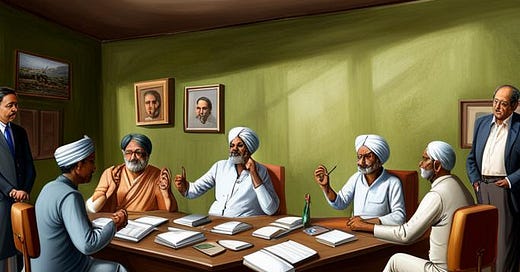




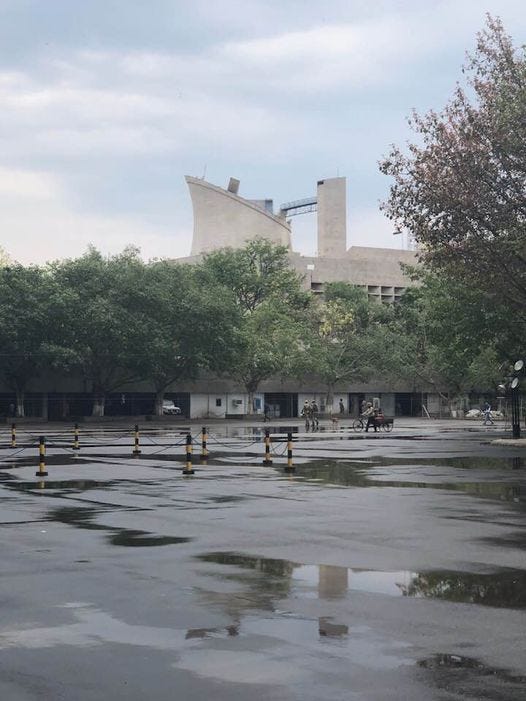
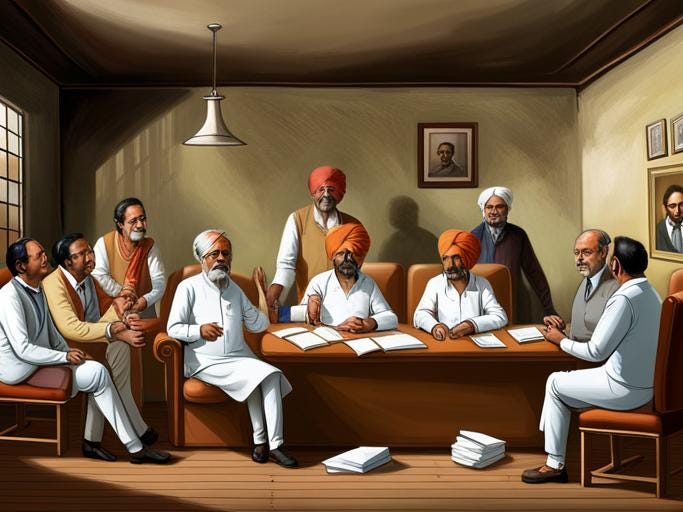
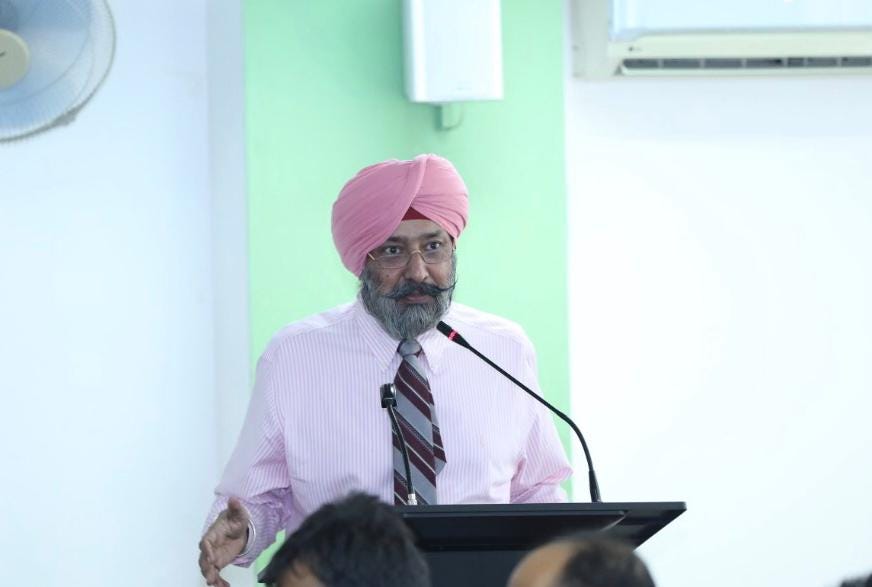
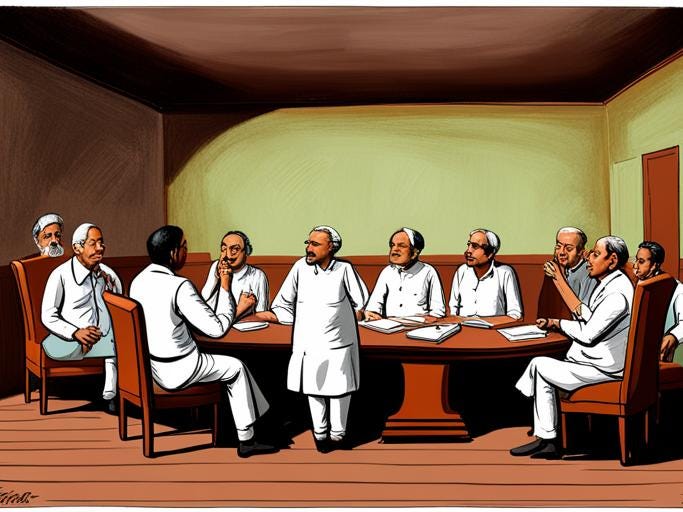


Respected Sir thank you @ beautiful article beautiful insight @ thank u so much for shaping our mind
16 point agenda focuses on collaborative culture for S(speedy) M(measurable) A(answerable) R(responsive) T(timely) governance. Thought provoking read. Need "Actionable Interventions". Both pillars, Bureaucrats(appointed) & Politicians (elected) work for rendering quick, affordable & well intentioned policy execution besides enforcement.